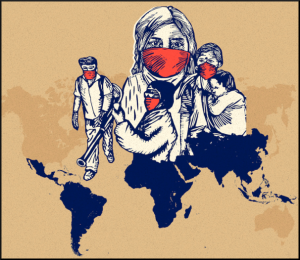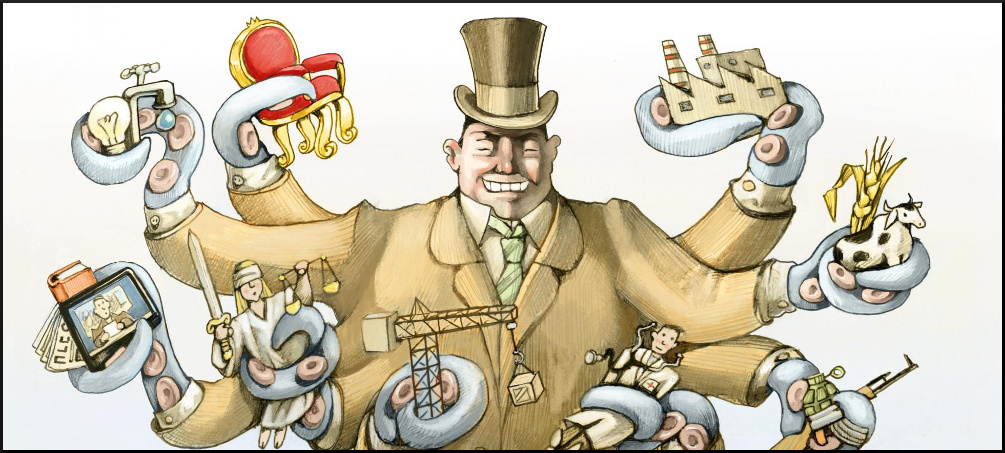By Prabir Purkayastha, published on The Bullet, May 14, 2020
We frequently hear that COVID-19 is the worst pandemic since the influenza of 1918. It is forgotten that another pandemic known as “the third plague” (because it was “the third major bubonic plague outbreak to affect European society”) killed millions from the 1890s to the 1950s in Asia’s southern, southeastern, and eastern regions, continuing well after the 1918 flu was over. It killed an estimated 10 million in India alone.
So why is this forgotten when we talk about pandemics today? The answer is the same reason behind the collective amnesia in wealthy nations on a whole host of diseases that still plague the world – diseases that Peter Hotez, a molecular biologist, wrote about in his book Forgotten People, Forgotten Diseases. (The World Health Organization [WHO] gives them the neutral term “neglected tropical diseases.”)
The question is who has forgotten such diseases. Certainly not the 65 per cent of people who are threatened by tuberculosis, malaria, dengue, yellow fever, and the other “forgotten” diseases Hotez lists.
It is the well-off countries who believed that infectious diseases did not concern them anymore. They were “forgotten” by the rich, as they believed they could keep such diseases outside their borders. The third plague was almost entirely restricted to the colonized world, leaving the colonialists in the comfortable belief that they had now conquered the infectious diseases that only affected dirty, flea-ridden, rat-infested parts of the world.
The COVID-19 pandemic proves that diseases can strike back, and we are always only one mutation away from a new infectious disease emerging.
Research Funds Drying Up
One of the consequences of the belief that infectious disease is no longer a concern of the rich is the drying up of research funds needed for developing new medicines for such diseases. Annually, tuberculosis kills 1.5 million people and infects 10 million (according to the WHO’s 2019 Global Tuberculosis Report), with India alone counting for nearly half a million deaths and about 2.7 million infected. Yet, it took four decades for new tuberculosis drugs to enter the market. The last three new medicines (mefloquine, halofantrine, and artemisinin) for malaria, which annually infects more than 200 million, were developed 50 years ago. Two out of three (mefloquine and halofantrine) were developed by the US Army for its soldiers fighting the US colonial war against Vietnamese liberation forces.
Venkatraman Ramakrishnan (Nobel Prize winner for chemistry in 2009) pointed out that the current model of developing medicine will not work for infectious diseases for two reasons. One is that drug companies do not see an incentive for developing a drug that cures patients in a few days. The other is that infectious diseases are far more prevalent in poorer countries, and the poor cannot pay the prices that multinational drug companies want. Whether it is medicines for infectious drugs or vaccines, both of which address public health issues, multinational companies and big pharma have very little interest. That is why infectious diseases have been forgotten – by rich countries, who think it is only a problem of the third world; and by big pharma, which does not see any profits from such drugs.
The COVID-19 pandemic has laid bare the other contradiction in the capitalist world: ill health produces profits; a healthy population does not. Money is to be made from disease when people buy pills or have to go to hospitals.
Public health was important as long as infectious diseases were perceived to be threats. As they became “forgotten,” so did public health in rich countries. In the case of hospitals, what drove the system was private profits for private hospitals. The same capitalist criteria were introduced as “efficiency” for public hospitals. The capitalist principle of maximizing efficiency was maximizing bed occupancy, a twisted form of “just-in-time manufacturing” introduced by capitalism that reduces inventories and therefore costs. Reducing beds, equipment, and medical staff is, in capitalism’s terms, “rationalizing” production and increasing “efficiency.”
When the COVID-19 epidemic hit advanced capitalist countries, particularly in the flu season when there is already a peaking of patient loads, they ran into a huge shortage of intensive care beds, equipment, doctors and nurses. This is what has led to such high death rates as the hospitals simply collapsed. That is not to mention other problems caused by the collapse of global supply chains, such as the lack of personal protective equipment (PPEs) and medicines.
 What has surprised most observers is the collapse of the health systems in the advanced capitalist countries. Forbes magazine in late January cited a Global Health Security (GHS) Index (a project of the Nuclear Threat Initiative and the Johns Hopkins Center for Health Security) “ranking” of countries that are “best and worst prepared” to handle the epidemic. In these rankings, the two countries that were on top were the US and the UK. The US today has the highest number of infections and deaths in the world; the UK has registered the highest number of deaths in Europe already. Almost all the countries that the GHS Index had ranked as best prepared – the US and the core EU countries – now have the worst numbers. These countries may have been prepared to handle normal health issues, and annual flu cases, but were completely unprepared for a novel infectious disease.
What has surprised most observers is the collapse of the health systems in the advanced capitalist countries. Forbes magazine in late January cited a Global Health Security (GHS) Index (a project of the Nuclear Threat Initiative and the Johns Hopkins Center for Health Security) “ranking” of countries that are “best and worst prepared” to handle the epidemic. In these rankings, the two countries that were on top were the US and the UK. The US today has the highest number of infections and deaths in the world; the UK has registered the highest number of deaths in Europe already. Almost all the countries that the GHS Index had ranked as best prepared – the US and the core EU countries – now have the worst numbers. These countries may have been prepared to handle normal health issues, and annual flu cases, but were completely unprepared for a novel infectious disease.
While East and Southeast Asia adopted masks, particularly with their brush with SARS (now renamed as SARS-CoV-1) in 2003 and the dangerous H5N1 version of avian flu, the advanced countries have no such experience. In the less affluent countries, there is still a collective memory of infectious diseases – plague, cholera, small pox, polio – and the public health measures that are needed during epidemics. There are even some surveillance and monitoring systems, however weak, that address such issues. For the people in the US, the threat of a new infectious disease is not even a part of their collective psyche. That is why, with an imminent lockdown, guns and ammunition were in as high a demand as medicines and food. The threat many Americans saw was clearly other people, and not the virus itself.
Globalized Community
Amit Sengupta, one of the founding members of the global People’s Health Movement, wrote extensively about the contradiction between capitalists and the rest of the world, between their greed for profits (and profiteering) and people dying for lack of medicine. He wrote, “Unethical behavior of health care providers is directly linked with the fact that if care is linked to profit, more ill health means more profit!… Governments, not markets, can ensure that health systems address the needs of the poorest and the most marginalized.”
It is not an accident that COVID-19 deaths are concentrated in the advanced countries among immigrant communities, the poor, and the socially excluded. It is the African American and Hispanic populations in the US who are seeing disproportionately larger numbers of deaths and infected. It is the immigrant areas in the EU and UK who are again seeing higher rates of infection and death. But diseases are also levelers; the poor and the excluded may suffer more, but COVID-19 will not spare the rich either. And this time, the rich countries who thought they had left their infectious past behind are beginning to understand that in a globalized world, they are also at risk from pandemics.
This is the question that Amit had posed in the last People’s Health Assembly in Dhaka, Bangladesh, in 2018. What happens when the hunger of capitalism enters the belly of the beast? When this hunger enters those countries that the GHS Index thought were best prepared to face the pandemic?
The novel virus – SARS-CoV-2 – has brought out the older challenge of disease back to the list of existential challenges that humanity faces. We know that the race between microbes and us is a continual battle. As we evolve our defense, they also develop their offense. We know that we upset the global ecological balance – climate change – at our peril. What is not understood widely – except by those on the left – is that the biggest obstacle to charting a path for humanity that lets us address these challenges is capitalists and their greed.
Pandemics have not only spread death and destruction, but they have also changed societies in fundamental ways. No, the world will not look the same once the COVID-19 pandemic is over with herd immunity: either through vaccination or infections. But will it lead to society confronting capitalism’s greed against people’s lives? That is the challenge before all of us; this is how history will judge us. •
This article was produced in partnership by Newsclick and Globetrotter, a project of the Independent Media Institute.
